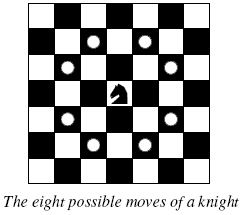POJ2488 A Knight's Journey
A Knight's Journey
| Time Limit: 1000MS | Memory Limit: 65536K | |
| Total Submissions: 11297 | Accepted: 3773 |
Description
 Background
Background The knight is getting bored of seeing the same black and white squares again and again and has decided to make a journey
around the world. Whenever a knight moves, it is two squares in one direction and one square perpendicular to this. The world of a knight is the chessboard he is living on. Our knight lives on a chessboard that has a smaller area than a regular 8 * 8 board, but it is still rectangular. Can you help this adventurous knight to make travel plans?
Problem
Find a path such that the knight visits every square once. The knight can start and end on any square of the board.
Input
The input begins with a positive integer n in the
first line. The following lines contain n test cases. Each test case
consists of a single line with two positive integers p and q, such that 1
<= p * q <= 26. This represents a p * q chessboard, where p
describes how many different square numbers 1, . . . , p exist, q
describes how many different square letters exist. These are the first q
letters of the Latin alphabet: A, . . .
Output
The output for every scenario begins with a line
containing "Scenario #i:", where i is the number of the scenario
starting at 1. Then print a single line containing the lexicographically
first path that visits all squares of the chessboard with knight moves
followed by an empty line. The path should be given on a single line by
concatenating the names of the visited squares. Each square name
consists of a capital letter followed by a number.
If no such path exist, you should output impossible on a single line.
If no such path exist, you should output impossible on a single line.
Sample Input
3
1 1
2 3
4 3
Sample Output
Scenario #1:
A1
Scenario #2:
impossible
Scenario #3:
A1B3C1A2B4C2A3B1C3A4B2C4
Source
TUD Programming Contest 2005, Darmstadt, Germany
1 #include <cstdlib> 2 #include <iostream> 3 #include <cstdio> 4 #include <algorithm> 5 #include <string.h> 6 #include <cmath> 7 using namespace std; 8 int map[10][10]; 9 10 int move_q[8]={-2,-2,-1,-1,1,1,2,2}; 11 int move_p[8]={-1,1,-2,2,-2,2,-1,1}; 12 struct node{ 13 int x; 14 int y; 15 }grap[64]; 16 17 char s[200]; 18 int flag=0; 19 int num; 20 21 int dfs(int p,int q,int fx,int fy) 22 { 23 int i,j,k; 24 int x,y; 25 26 27 if(num==p*q) 28 return 1; 29 for(i=0;i<8;i++) 30 { 31 x=fx+move_p[i]; 32 y=fy+move_q[i]; 33 if(x<1||y<1) 34 continue; 35 if(x>p||y>q) 36 continue; 37 if(map[x][y]) 38 continue; 39 map[x][y]=1; 40 s[flag++]=(char)('A'+y-1); 41 s[flag++]=(char)('0'+x); 42 num++; 43 if(dfs(p,q,x,y)) 44 return 1; 45 map[x][y]=0; 46 flag--; 47 flag--; 48 num--; 49 50 } 51 return 0; 52 } 53 54 55 56 57 58 59 60 int main(int argc, char *argv[]) 61 {//freopen("C:/Users/shp/Desktop/in.txt","r",stdin); 62 //freopen("C:/Users/shp/Desktop/out.txt","w",stdout); 63 int n; 64 cin>>n; 65 int i,j,k; 66 int p,q; 67 for(k=1;k<=n;k++) 68 {cin>>p>>q; 69 70 flag=0; 71 for(j=1;j<=q;j++) 72 for(i=1;i<=p;i++) 73 {num=0; 74 flag=0; 75 memset(map,0,sizeof(map)); 76 s[flag++]=(char)('A'+j-1); 77 s[flag++]=(char)('0'+i); 78 num=1; 79 map[i][j]=1; 80 81 if(dfs(p,q,i,j)) 82 {s[flag]='\0';cout<<"Scenario #"<<k<<":"<<endl;cout<<s<<endl<<endl;goto L;} 83 //else 84 //{cout<<"Scenario #"<<i<<":"<<endl;cout<<"impossible\n\n"; } 85 86 87 88 } 89 90 91 92 cout<<"Scenario #"<<k<<":"<<endl;cout<<"impossible\n\n"; 93 L:; 94 95 96 97 98 99 100 } 101 102 103 104 105 106 107 108 system("PAUSE"); 109 return EXIT_SUCCESS; 110 }



